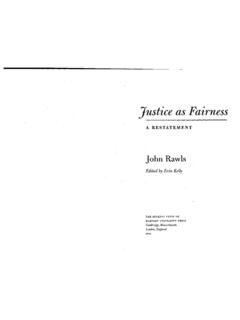Transcription of Immanuel Kant Perpetual Peace: A Philosophical Sketch
1 Immanuel KantPerpetual Peace: A Philosophical Sketch1795 Perpetual PEACEW hether this satirical inscription on a Dutch innkeeper's sign upon which a burial ground waspainted had for its object mankind in general, or the rulers of states in particular, who are insatiableof war, or merely the philosophers who dream this sweet dream, it is not for us to decide. But onecondition the author of this essay wishes to lay down. The practical politician assumes the attitudeof looking down with great self-satisfaction on the political theorist as a pedant whose empty ideasin no way threaten the security of the state, inasmuch as the state must proceed on empiricalprinciples; so the theorist is allowed to play his game without interference from the worldly-wisestatesman. Such being his attitude, the practical politician--and this is the condition I make--shouldat least act consistently in the case of a conflict and not suspect some danger to the state in thepolitical theorist's opinions which are ventured and publicly expressed without any ulterior this clausula salvatoria the author desires formally and emphatically to deprecate herewith anymalevolent interpretation which might be placed on his ICONTAINING THE PRELIMINARY ARTICLES FOR Perpetual PEACE AMONG STATES1.
2 "No Treaty of Peace Shall Be Held Valid in Which There Is Tacitly Reserved Matter for aFuture War"Otherwise a treaty would be only a truce, a suspension of hostilities but not peace, which means theend of all hostilities--so much so that even to attach the word " Perpetual " to it is a dubiouspleonasm. The causes for making future wars (which are perhaps unknown to the contractingparties) are without exception annihilated by the treaty of peace, even if they should be dug out ofdusty documents by acute sleuthing. When one or both parties to a treaty of peace, being tooexhausted to continue warring with each other, make a tacit reservation (reservatio mentalis) inregard to old claims to be elaborated only at some more favorable opportunity in the future, thetreaty is made in bad faith, and we have an artifice worthy of the casuistry of a Jesuit.
3 Considered byitself, it is beneath the dignity of a sovereign, just as the readiness to indulge in this kind ofreasoning is unworthy of the dignity of his if, in consequence of enlightened concepts of statecraft, the glory of the state is placed in itscontinual aggrandizement by whatever means, my conclusion will appear merely academic "No Independent States, Large or Small, Shall Come under the Dominion of Another State byInheritance, Exchange, Purchase, or Donation"A state is not, like the ground which it occupies, a piece of property (patrimonium). It is a societyof men whom no one else has any right to command or to dispose except the state itself. It is atrunk with its own roots. But to incorporate it into another state, like a graft, is to destroy itsexistence as a moral person, reducing it to a thing; such incorporation thus contradicts the idea ofthe original contract without which no right over a people can be knows to what dangers Europe, the only part of the world where this manner ofacquisition is known, has been brought, even down to the most recent times, by the presumption thatstates could espouse one another; it is in part a new kind of industry for gaining ascendancy bymeans of family alliances and without expenditure of forces, and in part a way of extending one'sdomain.
4 Also the hiring-out of troops by one state to another, so that they can be used against anenemy not common to both, is to be counted under this principle; for in this manner the subjects, asthough they were things to be manipulated at pleasure, are used and also used "Standing Armies (miles perpetuus) Shall in Time Be Totally Abolished"For they incessantly menace other states by their readiness to appear at all times prepared for war;they incite them to compete with each other in the number of armed men, and there is no limit tothis. For this reason, the cost of peace finally becomes more oppressive than that of a short war,and consequently a standing army is itself a cause of offensive war waged in order to relieve thestate of this burden. Add to this that to pay men to kill or to be killed seems to entail using them asmere machines and tools in the hand of another (the state), and this is hardly compatible with therights of mankind in our own person.
5 But the periodic and voluntary military exercises of citizenswho thereby secure themselves and their country against foreign aggression are entirely accumulation of treasure would have the same effect, for, of the three powers--the power ofarmies, of alliances, and of money--the third is perhaps the most dependable weapon. Suchaccumulation of treasure is regarded by other states as a threat of war, and if it were not for thedifficulties in learning the amount, it would force the other state to make an early "National Debts Shall Not Be Contracted with a View to the External Friction of States"This expedient of seeking aid within or without the state is above suspicion when the purpose isdomestic economy ( , the improvement of roads, new settlements, establishment of storesagainst unfruitful years, etc.)
6 But as an opposing machine in the antagonism of powers, a creditsystem which grows beyond sight and which is yet a safe debt for the present requirements--because all the creditors do not require payment at one time--constitutes a dangerous moneypower. This ingenious invention of a commercial people [England] in this century is dangerousbecause it is a war treasure which exceeds the treasures of all other states; it cannot be exhaustedexcept by default of taxes (which is inevitable), though it can be long delayed by the stimulus totrade which occurs through the reaction of credit on industry and commerce. This facility in makingwar, together with the inclination to do so on the part of rulers--an inclination which seems inbornin human nature--is thus a great hindrance to Perpetual peace.
7 Therefore, to forbid this creditsystem must be a preliminary article of Perpetual peace all the more because it must eventuallyentangle many innocent states in the inevitable bankruptcy and openly harm them. They aretherefore justified in allying themselves against such a state and its "No State Shall by Force Interfere with the Constitution or Government of Another State"For what is there to authorize it to do so? The offense, perhaps, which a state gives to the subjectsof another state? Rather the example of the evil into which a state has fallen because of itslawlessness should serve as a warning. Moreover, the bad example which one free person affordsanother as a scandalum acceptum is not an infringement of his rights. But it would be quitedifferent if a state, by internal rebellion, should fall into two parts, each of which pretended to be aseparate state making claim to the whole.
8 To lend assistance to one of these cannot be consideredan interference in the constitution of the other state (for it is then in a state of anarchy) . But solong as the internal dissension has not come to this critical point, such interference by foreignpowers would infringe on the rights of an independent people struggling with its internal disease;hence it would itself be an offense and would render the autonomy of all states "No State Shall, during War, Permit Such Acts of Hostility Which Would Make MutualConfidence in the Subsequent Peace Impossible: Such Are the Employment of Assassins(percussores), Poisoners (venefici), Breach of Capitulation, and Incitement to Treason(perduellio) in the Opposing State"These are dishonorable stratagems. For some confidence in the character of the enemy must remaineven in the midst of war, as otherwise no peace could be concluded and the hostilities woulddegenerate into a war of extermination (bellum internecinum).
9 War, however, is only the sadrecourse in the state of nature (where there is no tribunal which could judge with the force of law)by which each state asserts its right by violence and in which neither party can be adjudged unjust(for that would presuppose a juridical decision); in lieu of such a decision, the issue of the conflict(as if given by a so-called "judgment of God") decides on which side justice lies. But between statesno punitive war (bellum punitivum) is conceivable, because there is no relation between them ofmaster and follows that a war of extermination, in which the destruction of both parties and of all justice canresult, would permit Perpetual peace only in the vast burial ground of the human race. Therefore,such a war and the use of all means leading to it must be absolutely forbidden.
10 But that the meanscited do inevitably lead to it is clear from the fact that these infernal arts, vile in themselves, whenonce used would not long be confined to the sphere of war. Take, for instance, the use of spies (utiexploratoribus). In this, one employs the infamy of others (which can never be entirely eradicated)only to encourage its persistence even into the state of peace, to the undoing of the very spirit the laws stated are objectively, , in so far as they express the intention of rulers, mereprohibitions (leges prohibitivae), some of them are of that strict kind which hold regardless ofcircumstances (leges strictae) and which demand prompt execution. Such are Nos. 1, 5, and , like Nos. 2, 3, and 4, while not exceptions from the rule of law, nevertheless are sub-jectively broader (leges latae) in respect to their observation, containing permission to delay theirexecution without, however, losing sight of the end.


















